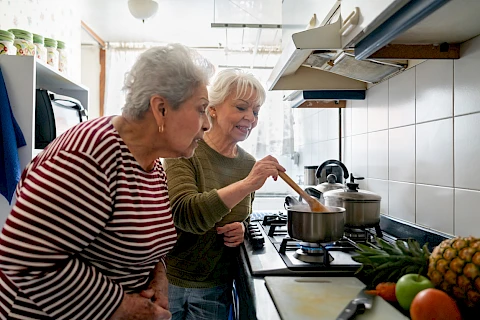
Aging brings changes that can affect how our bodies handle and react to food. As we get older, a weakened immune system makes us more vulnerable to foodborne illnesses. Common infections like salmonella, E. coli, and listeria can be more severe for seniors, potentially leading to hospitalization or even death. Recognizing these risks encourages taking the precautions needed to stay safe.
September marks National Food Safety Education Month, making it an ideal time to focus on safe cooking practices.
Proper Food Storage
Storing food correctly is one of the first steps to ensuring food safety. Keeping foods at the right temperature is vital to prevent bacteria growth. Refrigerate perishable items within two hours of purchase or cooking. Your fridge should be set at 40°F or lower, and your freezer at 0°F.
Organize your refrigerator and freezer to keep raw meats away from ready-to-eat foods like fruits and vegetables. Use clear containers and bags to help identify leftovers, and label them with dates.
Different foods have different storage durations. For example, cooked meats can be stored for 3-4 days in the fridge, fresh poultry for 1-2 days, and leftovers for 3-4 days.
Safe Food Handling
How we handle food can also impact its safety. Always wash your hands with soap and warm water for at least 20 seconds before and after handling food, especially raw meat. Use separate cutting boards for raw meats and vegetables. Clean surfaces and utensils thoroughly after each use to avoid cross-contamination.
Make sure your knives, cutting boards, and other utensils are clean and in good condition. Replace any damaged items that could harbor bacteria.
Safe Food Preparation Techniques
Preparing food safely ensures that harmful bacteria are killed. Each type of food needs to be cooked to a specific temperature to ensure it's safe. For example:
- Poultry: 165°F
- Ground meat: 160°F
- Fish: 145°F
A food thermometer is the best way to check if food is cooked properly. Insert it into the thickest part of the meat and wait for the correct reading. When reheating leftovers, make sure they reach at least 165°F to kill any bacteria that may have formed while stored.
Additional Tips for Seniors
Besides storage, handling, and preparation, there are more ways to keep food safe. Know the signs of spoiled food. If it smells off, has an unusual color, or mold, throw it out. When in doubt, it's better to be safe than sorry.
Wiping down surfaces, cleaning appliances, and regularly emptying the trash will keep your kitchen clean and prevent bacteria build-up.
Drink plenty of water and eat a balanced diet to support your overall health. Proper nutrition helps your body fend off potential illnesses.
Need Assistance With Meal Planning and Prep?
Carers must ensure food safety for seniors to prevent harmful illnesses. By following these simple yet crucial tips—proper storage, careful handling, and correct preparation—you can enjoy safe and healthy meals.
Do you or a loved one need help with safe cooking or any other senior care services? Contact Senior Helpers Greeley in Fort Collins, Loveland, Greeley, Wellington, and Longmont to see how we can assist you in living a happy, healthy life.